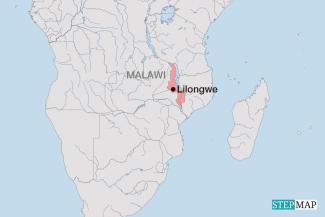Disaster
Ruins after cyclone Freddy

In February and March, the cyclone caused flooding in almost all districts in the southern region of the country and swept through villages, towns and Blantyre, Malawi’s commercial capital. It is reported that close to 1000 people were left dead and 2 million people affected by the disaster. Several families can still not trace their loved ones.
The cyclone has gone down as the worst climatic disaster in the country’s history. Previously, in 2019, cyclone Idai claimed up to 60 lives and in 2022, cyclone Anna displaced 221,127 people and killed 46.
“This was devastating. I only know that floods happen in Chikwawa and Nsanje districts close to the Mozambique border but having floods even here in Blantyre, is something new,” Alice Chapinga, 24, a victim of the flooding says.
Whereas Chapinga’s house was spared by the floods that erupted from Soche hills in Blantyre by about 30 meters, she is tormented by memories of seeing people being swept away alive by flooding. “I cannot sleep peacefully in my house because when I hear noise at night, I feel like another flood is coming and I run out of the house for safety,” Chapinga says.
Andrew Luka, 38, another victim who lost everything and now lives in a makeshift camp with his family in Blantyre, also experienced horrible things: “I saw how floods from the hilltop swept houses, trees and rocks and people with no one to rescue them. Many of those who died were children and women.” Luka adds: “It happened around lunch hour when many men were away on business in the town. When they came back, they realised that their homes were razed to the ground and their wives and children were missing or dead.”
Malawi’s government declared a state of emergency after the disaster. The government is pushing for legislation to promote climate action and mitigation measures. “I can report that the deluge from cyclone Freddy has brought our country to its knees more than any climate change event in living memory,” President Lazarus Chakwera said. He promised to deal with illegal settlement in eco-sensitive zones such as wetlands to prevent future damage to property and loss of life.
Increased human activity in climate sensitive zones is on the rise. Many people have built houses on steep slopes, close to riverbanks and other environmentally sensitive areas. Felix Washon, Malawi Red Cross’ Communications Manager, says that several issues have gone wrong: “Our settlements are poor. People are building houses in hilly places and other areas that are prone to disasters.”
Chimwemwe Njoloma, the deputy public relations officer at the Department of Disaster Management Affairs (DODMA), believes that communities have a stake in the recent loss of life and property. Her department has been warning people to move to safer places “but they did not take any action.” She says that activities such as illegal construction of houses along the riverbanks and in mountainous areas worsened cyclone Freddy’s devastation.
Raphael Mweninguwe is a freelance journalist based in Malawi.
raphael.mweninguwe@hotmail.com








